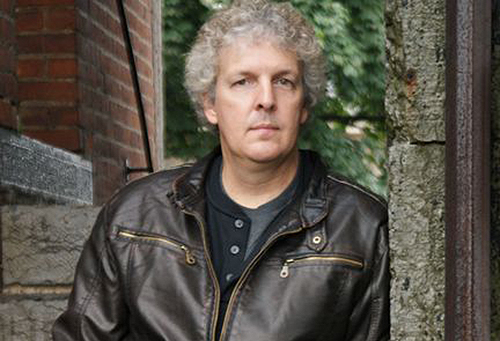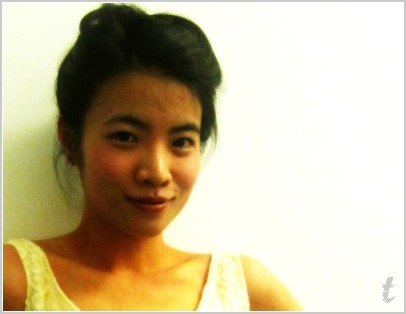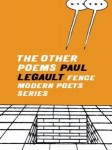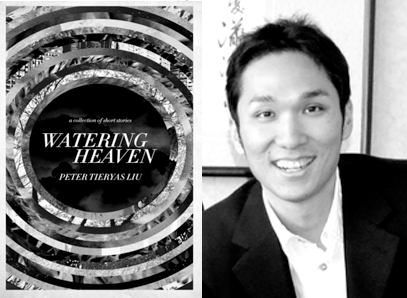Ron Riekki
The Upper Peninsula of Michigan is sometimes ignored on maps. And it’s often ignored in the literary world. But things are changing. Some powerhouse authors are emerging with strong links to the area—writers such as Catie Rosemurgy, John Smolens, Julie Brooks Barbour, Sally Brunk, Saara Myrene Raappana, Tom Bissell, Ander Monson, and Jonathan Johnson. But the two largest U.P. fan bases probably go to novelist Ellen Airgood and mystery writer Steve Hamilton.
A University of Michigan graduate, Hamilton has won every major crime writer award and just about every major Michigan writer award, including a Michigan Notable Book and a Michigan Author Award, which is the lifetime achievement in literature from the state of Michigan. With the film interest in his Edgar Award-winning The Lock Artist, Hamilton seems on the brink of major literary fame.
Ron Riekki: OK, I’ll just put this simply. You’re hot as hell right now. With the film interest in The Lock Artist, you’re on the verge of taking off on the biggest rocket ship of a writer’s career. Readers’ interest explodes when an author has a film of their book coming out. Can you talk a bit about that liminal phase.
 Steve Hamilton: Uh, hot as hell? Really? I’d accept lukewarm, maybe. But seriously, it feels more like a crossroads than anything else right now. After ten Alex McKnight novels (the most recent was Let It Burn in July of this year, I think it’ll be time for something different again, just like when I did The Lock Artist, but this time it seems even more wide open. We’re still working on the screenplay, so it’s not really “real” yet, if you know what I mean. But I guess we’ll see what changes in the next couple of years. Should be a lot of fun? I honestly don’t know. You’ll never see me on TMZ, that much I know. (And I’ll definitely go back to Alex at some point, by the way! I can’t imagine ever not wanting to know what he’s up to next!)
Steve Hamilton: Uh, hot as hell? Really? I’d accept lukewarm, maybe. But seriously, it feels more like a crossroads than anything else right now. After ten Alex McKnight novels (the most recent was Let It Burn in July of this year, I think it’ll be time for something different again, just like when I did The Lock Artist, but this time it seems even more wide open. We’re still working on the screenplay, so it’s not really “real” yet, if you know what I mean. But I guess we’ll see what changes in the next couple of years. Should be a lot of fun? I honestly don’t know. You’ll never see me on TMZ, that much I know. (And I’ll definitely go back to Alex at some point, by the way! I can’t imagine ever not wanting to know what he’s up to next!)
RR: The Lock Artist felt like it was written cinematographically. Can you talk a bit about filmic writing in novels? I had a similar feeling when I read Laura Dave’s writing. It’s very different, but as I was reading both, they felt made to be optioned by studios.
SH: I really, really didn’t think that way when I was writing it. And in fact, I’m not sure I’d ever want to think “film option” when writing a book—I’m gonna make you promise to shoot me if I ever do. But beyond that, I think I know what you mean. That story felt very personal to me, like I could reach out and touch it. Which I guess is what a story should do, whether it’s on the page or on the screen. Does that make any sense? (Seriously, if you ever hear me talk about the movie version while I’m in the middle of writing a book, I demand that you kill me on the spot.)
RR: You won the Hopwood at U of M., the award Arthur Miller famously won. Can you talk a bit about The Tomato Thief, your play that was performed to a huge audience at the Soo Theatre Project. You seem made for playwriting and screenwriting and that Arthur Miller link is just the start of it. You seem to love dialogue. I’m interested in your responses to The Tomato Thief, especially how enthusiastic the audience was to your playwriting.
SH: Well, that was just pure, absolute fun. I’ve seen people turn a story of mine into a film (The Shovel, made by Nick Childs), but that’s a whole different process. Watching a play is like just watching the whole story played out in real time, with living characters, right in front of you. And yeah, if you feel at home with dialog, then it’s a very natural move to try writing a play.
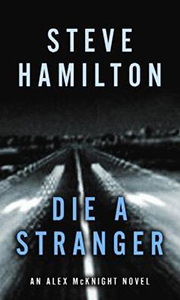 RR: OK, we’ve talked about your flirting with being a play guy. But you’re really a place guy. Setting is critical for your stories. Yoopers love you for this. With Die a Stranger, the characters are all over the U.P. and lower Michigan, up and down the roads in this intimate way, almost like a finger tracing lines on a lover’s hand. Both you and your characters seem to visit every nook and cranny of Michigan. Are your books love notes to place? (Even though there’s, of course, murders involved.)
RR: OK, we’ve talked about your flirting with being a play guy. But you’re really a place guy. Setting is critical for your stories. Yoopers love you for this. With Die a Stranger, the characters are all over the U.P. and lower Michigan, up and down the roads in this intimate way, almost like a finger tracing lines on a lover’s hand. Both you and your characters seem to visit every nook and cranny of Michigan. Are your books love notes to place? (Even though there’s, of course, murders involved.)
SH: Love notes with murders, yes! That’s perfect. But really, it’s just a matter of making the place like another character in the book. Which is standard creative writing class advice, I know, but still so true. For me, Michigan was the only choice, at least to start with, because that’s the place I know. And for the UP, especially, it’s a place that is totally unique. I’m sure you would agree, there is absolutely no other place in the world, for better or worse, quite like the UP.
RR: What are you not reading right now? Everybody tends to ask, “What are you reading right now?” But I’m curious—is there any type of writing you try to avoid? So that it doesn’t get stuck in your head? Or that you just don’t like? Or that you want to make sure your voice doesn’t echo?
SH: I am not reading Fifty Shades of Grey. I’m afraid that, if I let myself get sucked into that enthralling world, I’ll be lost forever. (No, just kidding! I actually read the first few pages and had to stop. Those are easy books to make fun of, I know, and God bless her for making a billion dollars on them–but sweet mother of mercy, that is some awful stuff.) Really, that’s the only answer . . . I’ll read anything that’s good, because I’m a reader first and always will be. (Right now, I’m reading The Maid’s Version by Daniel Woodrell.) But if you make me do the dog-head-tilt thing in the first few pages, I’m out!
Learn more about Steve Hamilton here and follow him on Twitter here.
Ron Riekki’s books include U.P. and The Way North: Collected Upper Peninsula New Works (Wayne State University Press, a 2014 Michigan Notable Book and Foreword Book of the Year Award finalist. Riekki’s writing has been published in numerous publications including New Ohio Review, Spillway, Mizna: Prose, Poetry and Art Exploring Arab America, Verse Wisconsin, and Juked. His next book comes out on Michigan State University Press in Spring 2015. Find him on Twitter here.

